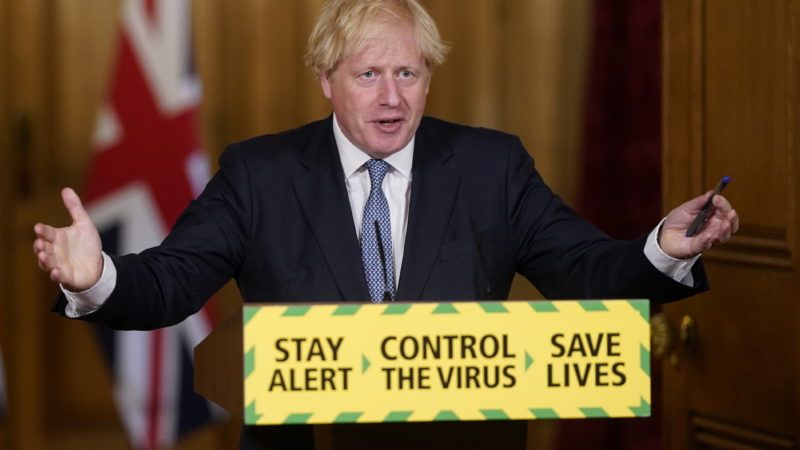After Brexit, British Eaters Buried in Red Tape
Prime Minister Boris Johnson embraces the nanny state after recovering from COVID-19.

Last week, Great Britain's Department of Health and Social Care announced sweeping plans to combat obesity by "empowering adults and children to live healthier lives."
"Many people have tried to lose weight but struggle in the face of endless prompts to eat—on TV and on the high (main) street," the health department announcement states. "In supermarkets, special offers and promotions tempt us to buy foods that are not on the shopping list but are hard to resist. When we eat out, we have little information about how many calories are in the food we are offered. We are biologically programmed to eat and when we are bombarded by advertisements and promotions for food—it's hard to eat healthily, especially if we are busy or tired or stressed."
To combat food discounts and other choices British adults are currently free and happy to exercise, Prime Minister Boris Johnson will "empower" them by restricting or eliminating those choices. His administration's absurd plan is epic in scope. It includes a new, subjective "traffic light" label for packaged foods; mandatory calorie labeling on restaurant food and alcohol beverages; banning buy-one-get-one (BOGO) foods that are high in fat, sugar, and salt (HFSS); restricting physical and online access to those foods; banning HFSS food advertising on television before 9 p.m.; and moving to ban online advertising of HFSS foods.
The introduction of this veritable nanny state starter kit suggests Johnson wasn't listening when I cautioned in early February that Great Britain was at a regulatory crossroads. Of course, I don't know the British leader. But as Johnson led the country into Brexit—the portmanteau that signaled Britain's exit from the European Union—I wrote a column urging Britain and Johnson to choose more freedom and less regulation of the country's food system and to cast off the E.U.'s abiding and nonsensical love of seemingly any and all food regulations.
At the time, that seemed possible. That was before Johnson, a longtime critic of exactly the sort of food policies he's now championing, had his come-to-asparagus moment after contracting COVID-19. Johnson, who admits he was overweight at the time he fell ill, was placed in an intensive care unit and nearly died. Since he left the ICU and recovered, Johnson has been eating healthier and taking his dog out for jogs. Good for him. Experts say COVID-19 death rates are higher in people with underlying health conditions, including obesity.
And Britons are obese. As last week's announcement notes, one-third of British primary-school children and two-thirds of adults are obese or overweight. Independent of COVID-19, those high rates cost lives and money and hurt productivity.
But Johnson's decision to turn his newfound personal dietary choices into a national dietary policy reeks of meddling, and—as I've explained time and again, citing research to support my case—isn't likely to have any impact on obesity rates. That fact doesn't appear to matter.
"The British prime minister once burnished his libertarian credentials by decrying sin taxes on producers of unhealthy snacks and sugary drinks, but the coronavirus has changed him," Bloomberg News reported last month. "The food industry should prepare itself for the consequences."
So too should consumers, who will likely see fewer choices and higher prices because of Johnson's new policies.
Johnson's dramatic food-policy reversal could help kill hopes Brexit will deliver on its promise. After all, one selling point of Brexit was that it would allow Britain to cast off the panoply of meddlesome E.U. food regulations. That, supporters argued, would make Britain more attractive to businesses, some of which Brexit leaders hoped would in turn relocate headquarters from the European continent to Britain. Instead, firms are fleeing Britain.
In my February column, I noted reports Johnson had declared war on the nanny state. Several months later, we know this much: If Johnson fought the nanny state, the nanny state won.
If Brexit's chief supporters—with Johnson chief among them—can't even be counted on to pass laws that distinguish Britain from the E.U., what really was the point of leaving the E.U. in the first place?
Show Comments (124)